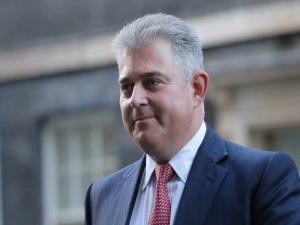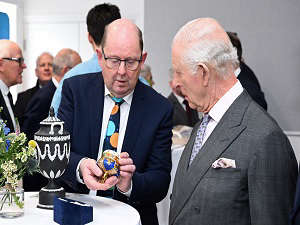
By Michael McHugh, PA
The Northern Ireland Secretary Brandon Lewis exceeded his powers in introducing abortion regulations, Stormont's chief legal adviser has said.
It is doubtful whether the legislation gives adequate European Convention on Human Rights-based protection to the rights of those opposed on religious or philosophical grounds, attorney general John Larkin QC added.
The lawyer wrote: "This is of political and legal significance and, given that the relevant judgment call is best made by a local legislature, it may be inappropriate for the provision to have been so limited in light of the changed political context."
A major change liberalising access to terminations in the region was introduced in March.
Julian Smith was the secretary of state when the regulations were being consulted on, but he was replaced by Brandon Lewis in February.
Ministers in Belfast have not introduced local provision after Mr Larkin raised legal points.
He gave written evidence to a House of Lords committee which published its report this week.
The Government introduced regulations allowing abortions last month after MPs passed a law last year in the absence of the devolved Assembly at Stormont.
Mr Larkin wrote: "In my view, it is disproportionate in the Northern Irish context (and therefore contrary to article 9 of the Convention) to require those who undertake ancillary, administrative and managerial tasks to act contrary to their conscience for service maintenance reasons as set out in the consultation response (particularly when the anticipated impact could be avoided through commissioning a dedicated service).
"Providing for broader conscience protection in regulation 12 would have been possible and would have assisted with Convention compliance by health and social care trusts."
New official regulations allow terminations on request in Northern Ireland for the first 12 weeks of pregnancy and up to 24 weeks where there is a risk of injury to the physical or mental health of the pregnant woman or girl.
Abortion will also be available in cases of severe and fatal foetal anomalies, with no gestational limit.
Former Police Ombudsman Baroness Nuala O'Loan also told the Secondary Legislation Scrutiny Committee of peers the regulations contained "grave flaws".
She wrote: "It is both deeply controversial in Northern Ireland because of its implications for people, doctors, nurses and midwives, and because it is my submission that the Secretary of State has acted beyond his competence and the regulations 'imperfectly achieve the policy objective'.
"It was also preceded by a flawed consultation process."
Regulation 12 provides limited legal protection for medical practitioners who object to abortion.
Baroness O'Loan added: "It is my further contention that regulation 12 discriminates against individuals on the grounds of their religious belief or political opinion."
She said the narrow definition given to the term 'treatment' in the regulation led to direct discrimination against individuals who on the grounds of religious belief or political opinion conscientiously objected to abortion.
She added the consultation which led to the regulations was "deeply flawed" since it only lasted for six weeks and was conducted during a General Election.
"Legislating for abortion and freedom of conscience is a devolved matter.
"Even were one to accept that the absence of a functioning Assembly gave Westminster a moral right to legislate, the fact is that the Northern Ireland Assembly was restored in January, long before the regulations were laid."
The former Ombudsman added: "The Northern Ireland Office (NIO) did not engage in a meaningful consultation with the Northern Ireland Executive or the Assembly more broadly on conscience.
"This was an affront to the people of Northern Ireland and wholly wrong."


 Nine Northern Ireland schools targeted with threatening email thought to be hoax
Nine Northern Ireland schools targeted with threatening email thought to be hoax
 Exhumed remains not those of Disappeared victim Joe Lynskey
Exhumed remains not those of Disappeared victim Joe Lynskey
 King and Queen conclude three-day visit to Northern Ireland
King and Queen conclude three-day visit to Northern Ireland
 Conor McGregor seeks to introduce new evidence in civil rape appeal case
Conor McGregor seeks to introduce new evidence in civil rape appeal case
 The UK’s ‘best places to live’ revealed in annual Sunday Times guide
The UK’s ‘best places to live’ revealed in annual Sunday Times guide